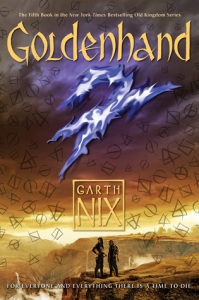
Spoilers abound!
For approximately 70% of Goldenhand, practically nothing happens. An unending chase eats up pages, it’s inevitable conclusion making the whole thing pointless and boring. Where other Old Kingdom books have very few unnecessary characters, this book has an entire cast of them, a village full of people who assist a secondary character in running away. All of them are pointless.
The chapters alternate between this chase scene an an equally endless holding pattern between Lirael and Nicholas. Where the Ferin sections (the chase scenes) have too many characters, the Lirael sections have too freakin’ few. It take roughly half the book for these idiots to stop being awkward, and while there are moments of occasional charm, it is frankly quite soon.
Essentially, the first part of the book is badly imbalanced. Ferin’s sections are packed with urgency, but that urgency can’t be felt when you know she’s going to escape, because if her message delivers everyone is going to die–which won’t happen. And it’s impossible to believe it will happen, when the momentum of her plot is ritually slaughtered every time we switch from her to Lirael, who is in a cliched romantic comedy without a shred of urgency to be seen. This tonal jarring is discarded in favor of Old-Kingdom-Flavored urgency and dread and dire peril, but the goofy comedy keeps bubbling up under the surface, diminishing the whole damn book.
Roughly 70% of the way through Goldenhand, Garth Nix’s editor woke up and the book got pretty good . I know exactly how long this took because I was keeping score. I counted 21 times when the narrative literally broke.
Nix, it turns out, has a habit of stepping out of his characters’ perspective. He turns to the reader and tells you what the characters don’t actually know, telling you that the characters don’t know it. “Neither Ferin nor Young Laska knew this,” “not acknowledging to herself,” “not noticing that behind her…” etc. About 70% in, these breaks (which completely murder reader immersion) stop happening.
Another sign of editorial napping is the way big apparent foreshadowings turn up, wave, and then evaporate. The first time this happens is when Ferin tells another character the super special secret message that she has been sacredly entrusted with from before she was even born–basically her whole destiny and plot purpose is this message, and she should really probably have died trying to deliver it. But she tells another character. A woman who disappears without a goodbye and is never heard from again.
Then there’s the moment when the Disreputable Dog reanimates her statue, goes to the window of a room, looks out at a boat coming into the Clayr’s Glacier, and turns back into a statue. When Lirael finds the statue, there is a boat pulling into the Glacier.
My brain practically exploded at that point. See, the last time a boat was in the narrative, it was full of free magic creatures chasing Ferin. Ferin, who just arrived at the Clayr’s Glacier. Oh my God, the glacier is being invaded!
But nope. Turns out the Dog was just glancing in on Nick.
Worse than this, Lirael’s brain is apparently on vacation during this whole sequence. See, she once saw the Dog statue turn into the actual Dog. And when the Dog dies, she turns back into the statue. Then the statue disappears from Lirael’s hand as she sleeps, and turns up on a windowsill in a position no Sending would have left it in. Does Lirael realize that the Dog is periodically coming back and taking the statue back with her? Nope.
On top of all these issues, there are cliche-sized holes in the narrative the Nix wove (which, again, contrasts like mad with the original Old Kingdom books). A guy and a girl of roughly the same age meet, instantly fall in love, and are having sex when the book closes (which is a crazy tonal jar, but whatever). As previously mentioned, Lirael spends half the book trapped in a corny rom-com. Both Mogget and the Dog return (the Dog after a wonderfully dramatic send off, but then she is disreputable), and though both returns are in keeping with their characters and neither is actual performs the dreaded deus ex machina, both are basically fulfilling the first half of the deus ex machina cliche. Forgivable only because their absence turned out to make the books terrible. Oh, and worst of all, Nix leaps through huge hoops to keep more powerful adult characters safely out of the narrative’s way while he lets the wheels spin in the first part of the book. There’s a big terrible flu and all the Clayr are sick, oh and Sabriel and Touchstone are on vacation for exactly as long as is necessary.
Now, in spite of all my complaining, I still loved the last third of this book. And somewhere under the unedited mess, there is in fact a very good story. Lirael goes back to the place that was once her home, and it is the same but she is far more different than she realizes. While there, she is able to make peace with the sorrow that was her childhood, and to step into a future where a boy will make everything better (did I mention the rom-com problem yet?). Then she goes on a long journey to meet a woman whose life, unlike Lirael’s was defined not by destiny but by choice–but who slowly became more and more adrift from the world and from humanity, until she was lost to herself.
There were better ways to do this. Clariel could have returned earlier in the narrative, through complicated Free Magic. Chlorr and Clariel being literally two different people was cliched. The rom com did not belong in an Old Kingdom book. But I’m happy, ’cause I got to see the Disreputable Dog.
Oh, and I hate the tagline. Practically no one dies in this book!